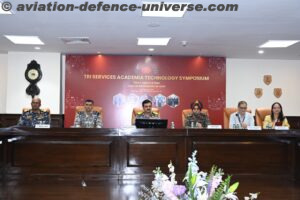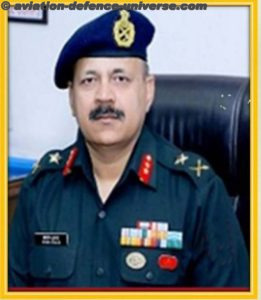By Sangeeta Saxena.
New Delhi. The Indian aerospace industry is one of the fastest growing markets in the world with civil, defence and space segments showing significant growth potential. Increase in FDI limit from 26% to 49% and focused initiatives such as ‘Make in India’ campaign and ‘Buy Indian’ as the first choice for defence procurement has also given a major push to industry players who are buoyed by the government’s commitment to upgrade its armed forces with indigenous products.
This focus on indigenisation in the aerospace sector drives the need to build an ecosystem covering the complete lifecycle of products. However, sustainable indigenisation will work only when we are able to lay equal emphasis on high end capability (people, systems, processes, tools and methods) and access to technology and funds. These are crucial factors which drive quality which, in turn, assure product safety. There is high demand and competition for good talent across all industry sectors that are dependent on innovation and creative thinking. And the aerospace industry is no different.
The aerospace industry needs engineers with the right technical skills combined with the applicable soft skills that are invaluable for the industry. A background in mechanical, electrical and electronic engineering or mechatronics, materials (for example, composites) and system integration knowledge is only the start, engineering talent need to be trained on the global skills that will make them receptive to international standards of safety and quality. While India is home to a million engineering graduates every year, it is the industry readiness of this vast talent pool that will play a key role in achieving the vision of creating a scalable and sustainable aerospace ecosystem in India.
At the moment, few Indian universities offer courses tailor-made for the aerospace sector and the country is yet to have an established and recognised institute/university specialising in aerospace. Therefore, talent that can be readily hired and deployed on programmes will continue to be a long-term ambition.
To build up such an ecosystem for aerospace, India needs technology and capability to cover the complete lifecycle of aerospace products encompassing R&D, engineering, manufacturing, testing and aftermarket services.
The skills requirement can be visualised in the form of a three sectioned capability or value pyramid. The bottom layer of the pyramid will encompass skills to carry out large volume of low end repetitive engineering tasks where volume, time-to-market and cost arbitrage is the key differentiator with limited focus on product /domain knowledge. The mid-layer will include skills to carry out product development/product support engineering activities with good understanding and knowledge about the products, processes and methodologies where end-user requirements are critical. Skills to carry out core and truly differentiating technology development and potentially research activities will be at the top of the pyramid.
To develop a sustainable ecosystem for the aerospace industry, we need to work towards developing talent to cover these three layers of the value pyramid. Through different business models such as engineering service organisations, joint ventures and captives, we can work towards building capability of the existing workforce and developing a strong pipeline of future talent.
Our talent pool requires foundational skills to get them ready for the industry in an accelerated manner. At the moment, only 2% of the Indian population has vocational skills compared to the high 70-100% in Japan, Germany, South Korea and the UK. The industry and government should perhaps focus on tackling these key challenges when thinking about talent development here.
Industry-readiness of the graduates/diploma holders to meet the aerospace & defence industry needs is vital. The local talent lacks the exposure to apply theoretical learning to practical problem solving aspects in their academic life. Professionals need to widen their limited domain knowledge and enhance the soft skills. Unavailability of high-end local domain expertise (lateral hires) of the required volume in relevant fields, with focus on quality excellence, slows down the pace of journey up in the value chain.
An underdeveloped career opportunity in the aerospace industry needs to be tackled to retain experienced technical specialist. In the absence of a significant manufacturing, service and repair base across the entire life cycle in India, our talents do not see clear career progression in the local aerospace industry to leverage their expertise across the value chain. This results in loss of training investment and time to constantly train new batch of talent in cycles.
A lot of learning from best practices could be tapped into to develop vocational skills here. What is needed is clear commitment towards building a career and industry path for talent who are interested in developing a career in the aerospace industry.The government could look into building a framework to recognise industry members who actively develop and implement technical career progression through continuous learning programmes. This will encourage industry players to invest in training and time to develop talent.
Backed by welcoming foreign talent to transfer knowledge and skills to local talent, this could be a successful start to developing sustainable skills development programmes. This could be further supported by putting together and formalising a framework between OEM captives and service providers, which will further drive innovation and encourage IP creation. Our aerospace capability is full of potential. To ensure success and maximise the development of the industry, it would take the next decade of structured and robust close collaboration between the industry, government and institutions. Once set on the right path, I am confident that the Indian aerospace industry will be globally recognised as a destination for investment and further growth.
Rajiv Pratap Rudy, Minister of State (Independent Charge) for Skill Development and Entrepreneurship has made a strong pitch for using defence offsets for creation of infrastructure and facilities for skill development in the country with a particular focus on defence and strategic manufacturing skills in India. In a letter sent to the Defence Minister, he made a strong plea that Defence offsets, if allowed to be used for skill development purposes, will help to enhance country’s defence manufacturing capabilities.
Use of defence offsets for skilling is also one of the key elements of the MoU on strategic partnership on skill development that was signed between the Ministry of Defence and Ministry of Skill Development and Entrepreneurship earlier last year on 13.07.2015. Thereafter, a proposal for supporting skill training of 50,000 persons and 700 instructors in various skills required by the Aerospace Manufacturing Sector at an estimated value of $150 million has been under consideration of the Government. Boeing India’s proposal is currently under due diligence of the newly formed Aviation and Aerospace Sector Skill Council (AASSC) that draws representation from wide range of stakeholders in the Aviation Sector.
Defence offsets if allowed in this particular case, would be used as a model for use of Defence offsets for skill development purposes. The current Defence offset guidelines do not include skill development services under its purview. However, the new Defence offset guidelines that are under consideration, specifically include creation of infrastructure for skill development to discharge Defence offsets obligations. Defence Offset provisions apply in cases, where Defence Capital Acquisitions of value of Rs.300 crore or more are done.
As per the proposed new guidelines under discussion, an outcome based approach will be followed for offset execution wherein a vendor will have the flexibility on process, but has to strictly ensure the realisation of the expected outcomes. These outcomes would now include creation of infrastructure for skill development including training of trainers, provision of teaching aids, preparation of curriculum material etc. Under the proposed guidelines Defence offsets for skill development would be overseen by a Committee under the Skills Ministry.
This Committee will identify skill sets and related infrastructure required to be acquired through offset route. Identification of skill sets, creation and subsequent certification of skill sets may or may not be related directly to the platform being procured even though the skill sets would be required to relate defence infrastructure and aerospace only. Once the Defence offsets are allowed for skill development purposes, it will give a big boost to skill development efforts in the country, particularly in raising the strategic manufacturing capabilities of the country.
The Minister of Civil Aviation P Ashok Gajapathi Raju has called upon all stakeholders in the civil aviation sector to urgently address the problem of shortage of skilled manpower . He was inaugurating a workshop on Skill Gap Analysis and Roadmap for Skill Development in the Civil Aviation Sector . Speaking on the occasion the Minister said that there is a tremendous mismatch between the kind of skills available in the sector today and the kind of skills required. He said stakeholders should come together to work out ways for skill development, taking into consideration the requirements and employment opportunities available in all segments of the civil aviation sector including MRO and cargo, both within and outside the country.
The draft report prepared by ICRA Management Consultancy Services Ltd. (IMaCS) has identified possible skill requirements across aviation segments like Airport, Airline, MRO, Cargo and Ground Handling. It has recommended building a robust training and skill building ecosystem through institutional strengthening, infrastructure and capacity planning, training process reengineering, strengthening funding mechanism and monitoring and evaluation. It has recommended, among other things, the setting up of a National Civil Aviation Training Authority and Cargo and Ground Handling Sector Skill Council.
Secretary, Ministry of Civil Aviation Rajiv Nayan Choubey, Secretary, Ministry of Skill Development and Entrepreneurship Rohit Nandan, CMD, Aerospace and Aviation Sector Skill Council T S Raju, senior officials of the Ministry of Civil Aviation and industry representatives attended the workshop. Speaking on the occasion Secretary Civil Aviation said that there is an urgent need to address the skill gap that exists in the civil aviation sector , and called upon leaders of various sub sections of the sector to come up with suggestions and give their views on IMaCS’ s draft report so that the future road map for skill development can be finalised.
Rohit Nandan, Secretary, Ministry of Skill Development and Entrepreneurship said that our skill training should be of international standards and should be able to take care of growth prospects of the people being trained so that they are employable even outside the country .
Hindustan Aeronautics Ltd in collaboration with the Bangalore Chamber of Industry and Commerce and the Society of Indian Aerospace Technologies & Industries has formed a non-profit organisation for developing skills in the aerospace and aviation sector. HAL Chairman is heading the governing council of the organisation .
The council comprises members from aviation majors, airport operators and academia. Air India, Jet Airways, Spice Jet, Indigo, GVK Group, Tata, ISRO . The council is mandated to train approximately four lakh persons over the next ten years in 90 different trades identified for better employment opportunities, improving employability and bridging gaps in skills required in this sector.
The sector skill council has the job to regulate the skill development activities in the industry sectors, including development of national occupational standards, qualifications, training curriculum and assessment criteria. The Council is mandated to train approximately four lakh persons over next ten years in 90 different trades identified for better employment opportunities, improving employ-ability and bridging gaps in skills required in this sector
The Indian aerospace sector will need at least a million fresh and skilled workers over the next 10 years, according to Rajiv Pratap Rudy, minister for skill development and entrepreneurship.“The aerospace sector would need at least 100,000 fresh skilled talent every year. Manufacturing, maintenance, repair, overhaul, operations and research and development are the areas where India needs fresh talent for aerospace sector,” Rudy said. “In the case of aerospace, 80% of the fresh and skilled talent is required for operations,” Rudy said. He said India is set to import aerospace products worth $100 billion in next 10 years, which in turn would provide a $30 billion offset opportunity for India.
The Aerospace and Aviation Sector Skill Council (AASSC) has drawn up a plan to certify about 5,20,000 trainees and groom 6,000 trainers over a 10 year period in the aerospace sector. “We have signed the term sheet with NSDC (National Skill Development Corporation) covering project objectives, segments, target training trades and broad execution plan,” T Suvarna Raju, Chairman and Managing Director of HAL, also the Chairman of AASSC, said.
According to Raju, about 30 courses will be introduced in the first three years to ensure greater relevance of skills in the aerospace sector battling for talent in various disciplines. “We also have a challenge to set up new institutes and centres of excellence. As an immediate step, we have now decided to appoint a CEO of AASSC with clear role to him”, he said.
When Prime Minister Narendra Modi launched his pet project Skill India Campaign in New Delhi on the occasion of the first ever World Youth Skills Day ,he also launched the National Skill Development Mission and unveiled the new National Policy for Skill Development and Entrepreneurship 2015.The Prime Minister said that each poor, underprivileged youth was a soldier in this war. “This mission is not limited to skill, we have linked entrepreneurship to it,” the prime minister said. He said over the next decade India will have a surplus manpower of 4-5 crore and emphasised the need to provide this youthful manpower with skills and ability to tackle global challenges. Modi warned that the demographic dividend would otherwise become a challenge in itself.
He also called for constant updating of training programmes and syllabi to ensure that the youth are exposed to the latest technology and industry environment. Linking the necessity to promote both apprenticeship and entrepreneurs, the prime minister said that it was important to predict the possibilities of the future and prepare for them today itself.
Skills and knowledge are the driving forces of economic growth and social development for any country. It’s no surprise that governments across the world are waking up to the significant role vocational education and training (VET) plays in their countries’ futures.

























































































































